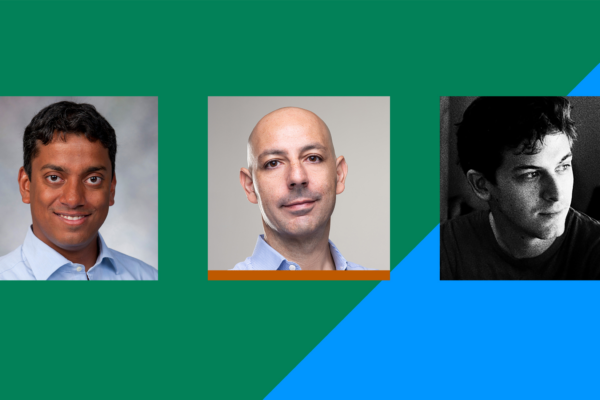AUSTIN, Texas — The John Simon Guggenheim Memorial Foundation has named three faculty members at The University of Texas at Austin to its 100th class of Guggenheim Fellows:
- Swarat Chaudhuri, professor of computer science.
- Feliciano Giustino, professor of physics and principal faculty member at the Oden Institute for Computational Engineering and Sciences.
- Eli Durst, studio art associate professor of practice.
The three were among 198 individuals to receive fellowships out of almost 3,500 applicants.
“Each of these faculty members shares a drive to have significant impact through their work,” said UT interim Provost David Vanden Bout. “Their fellowships through the Guggenheim Foundation will support inspiring artistic works, advances in artificial intelligence and important research relevant to the development of new quantum technologies. Their dedication builds on a track record of achievement by our faculty and their abilities to go on to transform their respective fields.”
Swarat Chaudhuri
Chaudhuri’s lab has developed an AI agent called Copra that repeatedly asks a large language model (LLM) to predict the next step in a proof of a mathematical theorem. Once the LLM chooses a step, the system uses it to simplify the problem, and the LLM makes another prediction. However, this method works only for theorems with set proof goals.
Through the fellowship, Chaudhuri will work on designing an AI agent that proposes new math problems and their solutions, and another one that evaluates the “interestingness” outputs of the first agent. Unlike his previous research, this project will emulate the curiosity-driven exploration that human mathematicians are known for. As such, it will be an important step, Chaudhuri said, toward “building AI systems that can co-author research papers with human mathematicians,” which would represent a major advance in the use of AI for mathematics.
Feliciano Giustino
A pioneer in computational condensed matter physics, Giustino will use the fellowship to investigate a new class of quasiparticles, topological polarons, that his team recently discovered while studying materials at the forefront of solar energy research. These exotic entities emerge when electrons moving through a crystal strongly interact with surrounding atoms, forming vortex-like structures. Giustino’s project will explore novel emergent phenomena arising from electron-phonon interactions that may inform future quantum technologies. “Topological polarons represent an unexpected bridge between electron-phonon interactions in condensed matter and topological concepts in mathematics,” Giustino said, “and they open the door to entirely new opportunities in quantum materials research.”
Giustino holds the W.A. “Tex” Moncrief, Jr. Chair in Quantum Materials Engineering and is internationally recognized for his foundational contributions to the theory of electron-phonon interactions, the development of open-source software for quantum simulations on high-performance computers, and the discovery of novel halide perovskites for solar cells and LED lighting.
Eli Durst
With the fellowship, Durst will undertake a photographic project exploring the future of evangelical Christianity in America by looking at large church congregations across Texas. Rather than reproducing the same reductive stereotypes seen in popular culture, he hopes to better understand what is so appealing to so many Americans about these epicenters of 21st-century Christian life and how these organizations create a sense of shared purpose and collective identity through faith.
Born and raised in Austin, Durst works to blend the languages of conceptual and documentary photography, creating open-ended and ambiguous narratives. He received the Aperture Portfolio Prize for his series “In Asmara,” which examines the postcolonial legacy of Eritrea’s capital city, and a 2017 Aaron Siskind Foundation Individual Photographer’s Fellowship Grant. He is also the recipient of multiple teaching awards, including the 2022 Department of Art & Art History Outstanding Teaching Award. He is also the winner of the Spring 2022 Hopper Prize. Durst has published two monographs, “The Community” (Mörel Books, 2020) and “The Four Pillars” (Loose Joints Publishing, 2022). Durst studied American literature and history at Wesleyan University and holds an MFA from the Yale School of Art.
Since its establishment in 1925, the John Simon Guggenheim Memorial Foundation has granted more than $400 million in fellowships to more than 19,000 individuals, among whom are more than 125 Nobel laureates, members of all the national academies and winners of the Pulitzer Prize, Fields Medal, Turing Award, Bancroft Prize, National Book Award and other internationally recognized honors.
“We believe that these creative thinkers can take on the challenges we all face today,” said Edward Hirsch, award-winning poet and president of the Guggenheim Foundation, in today’s announcement, “and guide our society towards a better and more hopeful future.”




